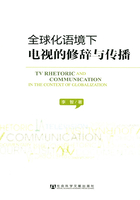
Abstract
Globalization is an inevitable stage in the development of human society. The exchange and interdependence between countries in economy, politics and culture are evidently growing. In the process of globalization, with constant development in science and technology and human cognition, the media greatly contributes to the speeding-up of information transmission and the expansion of its scope, as well as diversification of the channels of information flow. It is no exaggeration to say that the equivalence of information transmission within one country and between countries is critical to the stability of the whole world pattern.
As a significant carrier of information transmission, TV has profoundly changed human society. In the national information transmission system, TV is still the most important transmission platform. Meanwhile, according to Michel Foucault's theory, TV is an important text of social discourse, which reflects social changes and reacts upon the human world.
The book, TV Rhetoric and Communication in the Context of Globalization, in an attempt to break through traditional TV studies methods, takes rhetoric as the entry point and introduces both traditional and modern rhetoric theories into TV studies,and tries to explore the construction and identity of TV discourse in the context of globalization. Historically, eastern and western traditions in rhetoric differ in emphasis world. Modern rhetoric in western society has opened up new horizons for human beings on a philosophical level. The book, TV Rhetoric and Communication in the Context of Globalization, has adopted theories of rhetoric in each aspect of TV studies, including the writing of audio and visual language, the narrative interaction between rhetorical subjects and objects, identity in the context of globalization,etc. , aiming to provide new concepts and methods for TV communication in the context of globalization.